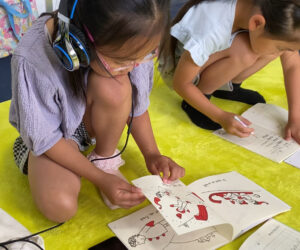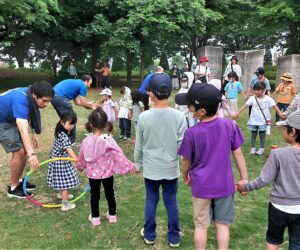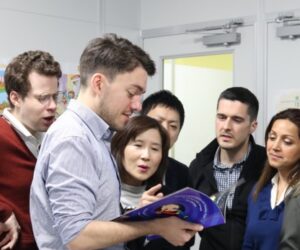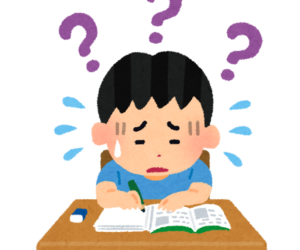Welcome to MY English School’s teaching web journal!
We have a blog on MY’s main website that highlights events and some of what we do at MY. That blog gives a great glimpse of our schools. This journal is from the perspective of MY’s teachers, about how we teach, why we teach, what we teach, and where we teach. It gives us the space to talk about our teaching, share about ourselves, learn from each other, and become better teachers.
MY English School was founded in 2001 in Higashine, Yamagata, Japan, to provide quality English language education to companies, organizations, and individuals. Owned and operated by a licensed, experienced teacher, MY has grown to include Yamagata’s only immersion bilingual kindergarten, in addition to language schools across Yamagata prefecture and in Hyogo.
MY’s teachers have hailed from over dozen different countries and come with a variety of teaching and other professional experiences. This journal is a space where we share our voices.









Good evening.
This is Rodrigo Trujillo at your service, and I would like to inquire about the opportunities and position that are offered at the website Gaijin Jobs, but I noticed that the startings dates are on a period of March – April, I’ll be in Japan from 15th of May, for what I would like to know if there will be any other opportunity on a period of May – June, or afterwards on the current year.
Also, I have to say that I’m not a English native speaker, I am actually Latin American, Mexican to be precise, I honestly hope that this is a situation that not reduces nor invalidate any chance to applying.
To whichever opportunity or suggestion that may be offered I’ll appreciate the attention.
Thank you for your time, have a nice day.
Thanks for the interest, Rodrigo! We can sometimes be flexible with start dates. The academic year in Japan starts in April, so that’s when our classes and new teaching schedules begin. The best thing to do is to apply, and then we can discuss the details of the start date during an interview. Please apply!
Hello.
My name is Martin and I actually sent in an application for
your job posting through gaijinpot.com. I wanted to follow up on
my application because I’m truly interested in having the chance
to learn more and hopefully work with your company.
If there’s anything in my application that you had questions about,
please let me know and I’d be more than willing to answer them
and provide more clarity. I really hope to hear from you soon. Have
a great rest of the week.
All the best,
Martin Robles
Thanks for your application, Martin, and thanks for taking a look at MY’s teaching blog! David or Qim from our hiring team should be in contact with you shortly about your application!
Hello, I noticed you are looking for English teachers. I work in the Job Placement Service at Oxford Seminars and we have many skilled teachers graduating from our courses monthly who are looking to Japan for their next teaching opportunity.
Our Job Placement Service would provide you with:
• Applications in line with international ESL standards
• Candidates that meet your specific requirements
• Prospective employees prepared for your unique application process
Let me know if you’d be interested in working together, and have a great day!
Best Wishes,
Lucas Laplante,
Job Placement Advisor, Oxford Seminars
Thanks for connecting with us! MY is currently searching to replace a teacher who has been with us since 2015. If you know any teachers interested who might meet our qualifications, please encourage them to submit an application!
I was thinking of applying; however, I was just curious what the working hours would be like. What time would I start and finish? Thank you some much for your attention.
Jason,
Thanks for your interest in MY!
We are happy to talk in detail about work hours during an interview. Depending on what position you apply for, specific details about hours vary.
For now, I can give a short, general summary: MY caps a full-time teacher’s average weekly lesson hours at 28. A simple example of a schedule might be 5 one-hour evening lessons each day Tuesday-Friday and 6 lessons on Saturday, plus another one or two hours of offsite business or kindergarten lessons. We don’t schedule teachers for more than 7 lessons in one day. A teacher’s schedule averaging above 28 hours per week or with more than 7 lesson hours in a day would earn overtime. That said, we don’t want to burn out our staff, so we don’t typically schedule overtime hours.
If your question is about start and finish times each day, schedules can vary a lot. No two teachers keep exactly the same schedule. Immersion kindergarten teachers and ALTs work mostly during daytime hours, occasionally with a few evening or weekend hours. A language school teacher may work 5 p.m. to 9 p.m. one weekday, while another weekday might have a lesson starting at 10 a.m. with a break in the middle of the day and more lessons in the evening.
New schedules are set in April. A teacher’s schedule can change throughout the year, but schedules stay consistent week-to-week for the most part. In an interview, we will know details about the open position that you are applying for, so we should be able to give more specific details about hours.
Hope this answers your questions! We look forward to your application!
Hello,
I am a retired American teacher over 60 and need to know your age limit for accepting applications. I have taught in South Korea, Italy and various areas in Japan. I presently live with my wife in Tokyo after retiring last year? What is your age limit, please, for applicants seeking to teach English? Thanks very much.
Andre Elliott, Ph.D.
Andre,
Thanks for your interest! MY’s aim is to hire teachers who will be effective for our students. The age of a teacher isn’t a strong consideration. Can a person teach? Can the teacher adapt to MY’s teaching style and curriculum? Can the teacher grow at MY and contribute to MY? We are far more interested in the answers to these questions than we are about age.
Japanese labor law generally sets retirement age at 60, but then gives companies the option to “rehire” the same employee to continue working past age 60. The reasons behind this are rooted in Japan’s lifetime employment system, but it can create difficult situations for many older workers. We are very open to considering your application. Feel free to contact our Hiring Team to discuss your situation further!